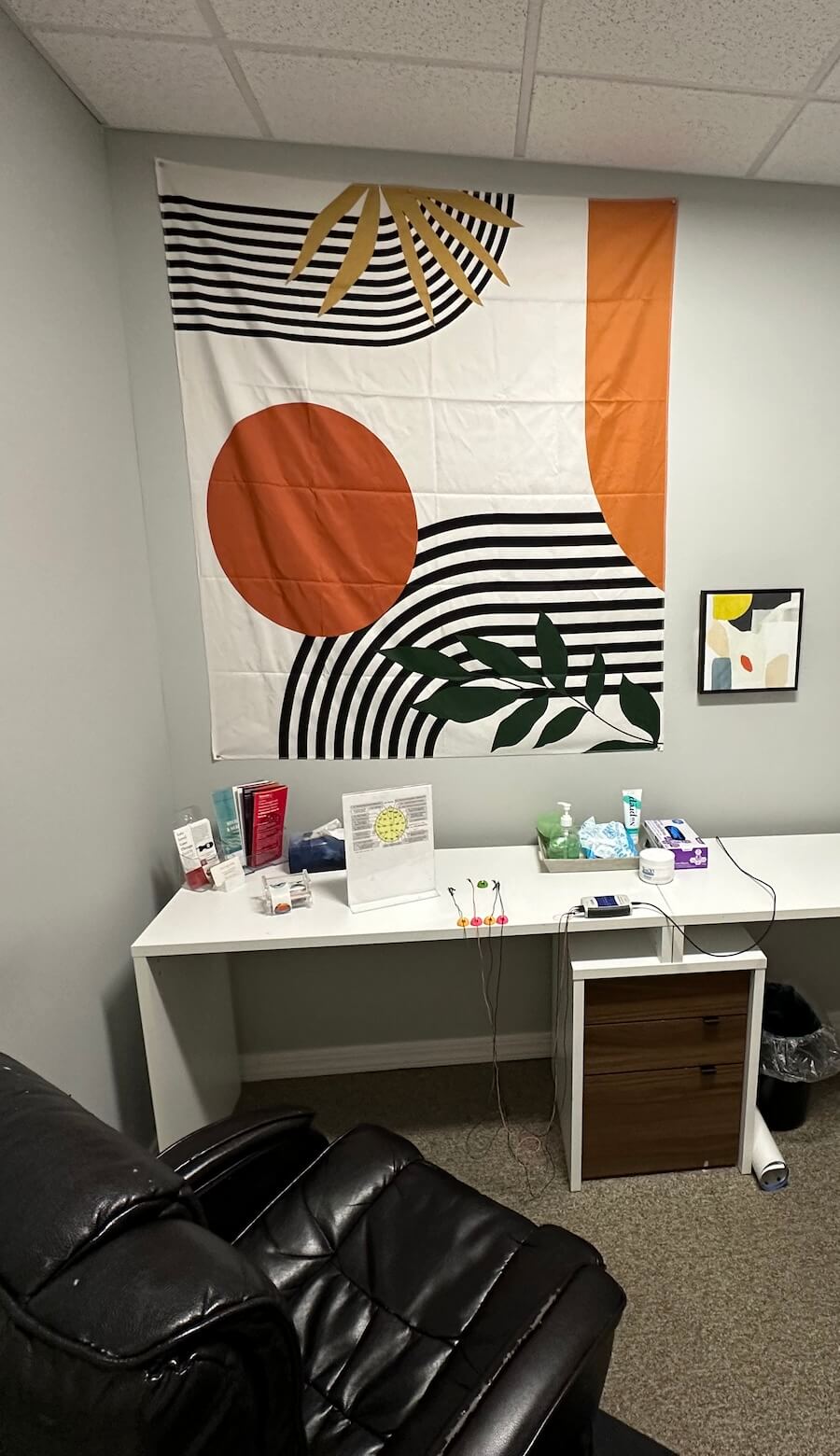LENS Neurofeedback: Optimizing Brain Function for Better Living

What is LENS Neurofeedback?
Low Energy Neurofeedback System (LENS) is a cutting-edge therapeutic approach that uses very low-power electromagnetic fields to help the brain reset and optimize its functioning. LENS neurofeedback is different from traditional neurofeedback because it requires minimal conscious effort from the client. It works by gently stimulating the brain to disrupt maladaptive patterns and promote healthier brainwave activity. This process can lead to improvements in a variety of mental and physical health conditions, enhancing overall well-being.
How Does LENS Neurofeedback Work?
LENS neurofeedback operates by using sensors placed on the scalp to measure the brain’s electrical activity. These sensors then deliver tiny electromagnetic pulses to the brain, which are so subtle that clients often do not feel them. The pulses are designed to slightly disrupt the brain’s current patterns, allowing it to reorganize and function more efficiently.
Key Components of LENS Neurofeedback to treat ADHD, trauma, concussions, depression, addiction, and more.
Assessment
The process begins with a thorough assessment of the client’s brain activity. This helps to identify areas of dysregulation and tailor the treatment to the individual’s needs.
Mapping
A brain map is created by recording the brain’s electrical activity from different areas of the scalp. This map helps to guide the neurofeedback process and track progress over time.
Stimulation
During a session, the LENS device delivers low-energy electromagnetic pulses to the brain. These pulses are brief and targeted, lasting only a few seconds per area.
Response and Adjustment
The brain responds to the stimulation by adjusting its electrical activity. This response is monitored and used to adjust future sessions for optimal results.


Goals and Benefits of LENS Neurofeedback
The primary goal of LENS neurofeedback is to help the brain achieve a state of optimal functioning. Specific benefits include:
- Reduced Symptoms of Mental Health Conditions: LENS can help alleviate symptoms of anxiety, depression, PTSD, ADHD, and other mental health issues.
- Improved Cognitive Functioning: Clients often experience better focus, memory, and mental clarity.
- Enhanced Emotional Regulation: LENS can help individuals manage their emotions more effectively, reducing mood swings and emotional reactivity.
- Better Sleep: Many clients report improved sleep quality and reduced insomnia.
- Pain Reduction: LENS can help manage chronic pain conditions by optimizing brain function and reducing pain perception.
- Increased Overall Well-Being: Clients often feel more balanced, calm, and resilient in their daily lives.
Hear from Others
“Neurofeedback has improved my brain health which has in turn improved my quality of life. It has helped ease anxious thoughts and depressive tendencies among many other noticeable benefits. I am so grateful for the care and assistance that I’ve received at the Holistic Health and Healing Center.” – HS
“I walked into neurofeedback very skeptical almost a year ago. I had taken every medication and tried almost every therapy possible, I am shocked at the results it has given me and my family, it brought me back to life and truly saved my life. The staff is phenomenal very accommodating and make you feel as If your there with friends. I can’t say enough good things about it!” – NV
Who Can Benefit from LENS Neurofeedback?
LENS neurofeedback is suitable for individuals of all ages and can be effective for a wide range of issues and conditions, including:
- Anxiety and Depression: Reducing symptoms and improving emotional stability.
- PTSD and Trauma: Helping individuals process and recover from traumatic experiences.
- ADHD: Enhancing focus, attention, and impulse control.
- Autism Spectrum Disorder: Improving communication, social skills, and behavior.
- Chronic Pain: Alleviating pain and improving quality of life.
- Sleep Disorders: Addressing insomnia and other sleep-related issues.
- Migraine and Headache: Reducing the frequency and intensity of migraines and headaches.
- Substance Abuse Recovery: Supporting individuals in overcoming addiction by stabilizing brain function
What to Expect in LENS Neurofeedback

Duration and Frequency
LENS neurofeedback sessions typically last between 20 to 45 minutes. The frequency of sessions can vary, but many clients start with one to two sessions per week. The total number of sessions required depends on the individual’s condition and goals, but noticeable improvements are often seen within 10 to 20 sessions.

First Session
The initial session involves a comprehensive assessment, including a detailed discussion of the client’s history, symptoms, and goals. The therapist will also begin to create a brain map by recording the brain’s electrical activity from various points on the scalp. This map serves as a baseline for monitoring progress.

Subsequent Sessions
During follow-up sessions, the therapist will place sensors on the scalp and deliver the low-energy electromagnetic pulses. The client will sit comfortably and relax during the process. The therapist will monitor the brain’s response and adjust the treatment as needed.
Frequently Asked Questions
How does LENS neurofeedback differ from traditional neurofeedback?
LENS neurofeedback uses very low-power electromagnetic pulses and does not require conscious effort from the client, making it a passive and often faster-acting treatment compared to traditional neurofeedback.
Is LENS neurofeedback safe?
Yes, LENS neurofeedback is safe and non-invasive. The electromagnetic pulses used are extremely low in energy, posing no risk to clients.
How long does it take to see results from LENS neurofeedback?
The timeline for results varies, but many clients notice improvements within 10 to 20 sessions. Some individuals may experience positive changes after just a few sessions.
Can LENS neurofeedback be used for children?
Yes, LENS neurofeedback is suitable for children and adolescents. It can be particularly effective for conditions such as ADHD, autism, and anxiety.
Does LENS neurofeedback involve any discomfort?
No, LENS neurofeedback is painless and non-invasive. Clients typically do not feel the electromagnetic pulses.
Can LENS neurofeedback help with sleep disorders?
Yes, LENS neurofeedback has been shown to improve sleep quality and reduce insomnia by optimizing brain function and promoting relaxation.
How do I know if LENS neurofeedback is right for me?
A consultation with a trained LENS neurofeedback therapist can help determine if this treatment is suitable for your needs. The therapist will assess your condition and create a personalized treatment plan.
What should I do to prepare for a LENS neurofeedback session?
No special preparation is needed for LENS neurofeedback. It’s helpful to come to sessions with an open mind and be willing to engage in the process.
Can LENS neurofeedback be combined with other therapies?
Yes, LENS neurofeedback can be integrated with other therapeutic approaches, such as cognitive-behavioral therapy (CBT) or mindfulness practices, to enhance overall treatment effectiveness.
Pricing and Insurance Information
Neurofeedback is covered by Husky and some Cigna plans. We have self-pay rates for patients who have other insurance plans. The intake is generally covered by insurance. Payment is due per session. HSA accounts can be used for services.
Intake: $250
LENS Neurofeedback includes Bioregulation Therapy
- 30 min session
- $125 per session
- *We recommend sessions 1-2 times per week for optimal results
Bioregulation Therapy
- 45-60 in session: Per session $75, series of 8 $550.00
- *We recommend sessions 2-3 times per week for optimal results.
☼ SUMMER SPECIAL ☼
- Lens Neurofeedback and Bioregulation Therapy
- 30 min session
- ONE FREE SESSION with intake, then $95 per session*
- Begins April 21, 2025, and ends September 30, 2025
LENS neurofeedback provides a unique and effective approach to improving brain function and enhancing overall well-being.
By harnessing the brain’s natural ability to reset and optimize its activity, LENS can help individuals achieve better mental and physical health. If you are interested in exploring LENS neurofeedback, we invite you to contact our office to begin your journey toward optimal brain health and well-being.
